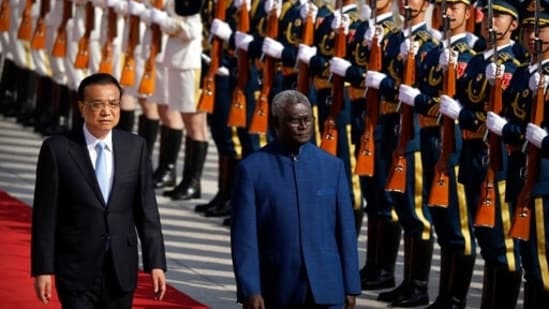CHINA SOLOMON ISLANDS SECURITY PACT

Copyright infringement is not intended
Context: China had signed a wide-ranging security pact with the Solomon Islands that can give Beijing a military foothold in the South Pacific.
Agreement has provisions:
- Allowing Chinese security and naval deployments to the crisis-hit island nation.
- Armed Chinese police may be deployed and it offers Chinese naval vessels a safe harbor. The deal, it is understood, also provides Chinese personnel with 'legal and judicial immunity'.
Where are Solomon Islands?
- The Solomons are an archipelago of hundreds of small islands in the southern part of the Pacific Ocean.
- It is located approximately 2,000 km NE of Australia.
- There are six big islands - the largest, Guadalcanal, is home to capital Honiara. The others are New Georgia, Santa Isabel, Choiseul, Malaita, and San Cristobal.
- The population is roughly 800,000 and over a quarter live either on Guadalcanal or Malaita. There are a few thousand people of ethnic Chinese heritage.
- The Solomon Islands are well over 9,000 km from India.
Why is China's security deal raising worries?
- Islands are a key World War II battlefront that is recognised by China only in 2019 after switching from ties with Taiwan.
- The pact is being seen as major shift in local geopolitics since it gives China direct access to the South Pacific, including Australia and New Zealand.
- Principal concerns are
- China will build a military base in the Solomon Islands
- China can deploy police, armed police, military personnel
- The Solomon Islands has great strategic significance, as was evident during WW II, when it served as a bulwark for Australia against the advancing Japanese.
- The Solomon Islands could fall into Beijing's debt trap amid promises to funnel billions in mega infrastructure projects by Chinese firms.
- Solomon Islands sits on critical shipping routes, meaning China could potentially control maritime traffic in and around the region.
- It is seen as a counter to AUKUS - Australia, the United Kingdom and the US - partnership, since the Solomon Islands has moved towards China rather than Australia, and the West bloc, raising doubts over other Pacific island nations' future steps.
Does the China-Solomon Islands pact affect India?
- The islands are a significant distance from mainland India and even the Andaman and Nicobar Islands.
- China's advances in the region, however, will be a cause for concern even in Delhi.
Beijing’s Pacific policies
- Beijing’s Pacific policies had been predominantly marked by economic engagement, including via the Belt and Road Initiative, rather than overt strategic considerations.
- Chinese government succeeded in convincing two Pacific Island states, Kiribati and Solomon Islands, to switch recognition from Taipei to Beijing.
- China’s political designs in the Pacific were revealed by a draft security agreement between China and the Solomon’s that includes provisions for stationing Chinese military and police personnel in the island state and allowing Chinese vessels to replenish supplies there.
- Beijing has already militarised outposts in disputed areas of the South China Sea – parts of which are also claimed by Brunei, Malaysia, the Philippines, Taiwan and Vietnam – and has carried out repeated incursions into waters around the disputed islands known in Japan as the Senkakus but in China as the Diaoyus.
U.S. response:
- Washington is developing its “pivot” or “rebalance” policies in the Asia-Pacific out of concerns about China’s potential to create a sphere of influence in the region.
- It expressed worries that this agreement can formalise Chinese military presence in the southern Pacific.
- It raised concerns about China’s expansionist policy as it hinders Australia’s or the United States’ vision of a “free and open Indo-Pacific”
- It accuses China of undermining the Pacific nation’s integrity and only acting in their national interest.
Australia Response:
- It has been stepping up efforts to prevent the Solomon Islands from officially signing the agreement.
- In light of the China-Solomon Islands security pact, Australia has to build its regional soft power and diversify links with Pacific nations. Australia is not solely basing its Pacific engagement policies on marginalizing China.
Wider geopolitical perspective
- The security deal appears to be a direct response to the establishment or revival of larger Indo-Pacific security groupings. In particular, the AUKUS pact.
- Signing such an agreement could actually increase destabilization within the Solomon Islands and could set a concerning precedent for the wider Pacific Island region.
- The security deal has impacted the already fragile state of Pacific multilateralism, in light of the possible fracturing of the Pacific Islands Forum with the departure of its Micronesian members.
- Hard power focus will undermine other concerns among the Pacific Islands that includes issues of climate change and sea-level rise.
https://www.thehindu.com/news/international/china-solomon-islands-sign-landmark-security-pact/article65335863.ece



1.png)
